|

|
Table of Contents
Home
Slavery
& Race
The South
Visual
Representations
Memorials
& Appropriations
Slavery
& Race
Sarah
Henderson
Joe Levell
Dan Haller
Nick
Schradle
The South
Dean DeChiaro
Steve Schaffer
Rick Ramirez
Visual
Representations
Alana Lemon
Jon Ingram
Peter Fúster
Aaron Stanton
Memorials
& Appropriation
Charles
Bennett
Molly Storer
Emma
Thorne-Christy
Other Online
Exhibits
|
Memorials &
Appropriation
Introduction
Our study focuses on commercial
appropriations of Lincoln’s name,
image, and values. In
keeping with this aim, we have
selected several commercial
advertisements dating from roughly
1900 to 1950. All these
advertisements were produced by
companies located in historically
Union states, particularly from
areas with large numbers of
Midwesterners who held a strong
reverence of Lincoln. [more]
It is presumed that both
producer and consumer for most
of the advertised products
viewed Lincoln positively. There
is an expectation on the part of
the advertiser that everyone
likes Lincoln, due to the effect
of reconciliation. A
reconciliationist narrative
produced a Lincoln image devoid
of historical fact. These
advertisements are vacuous in
that they are void of any real
content. They fail to
acknowledge Lincoln’s
controversial role in the Civil
War and ending slavery. The lack
of controversial content
pertaining to Lincoln make these
commercial representations
unobjectable, effective in their
ambiguity.
We found several commonalities
between the various pieces in
our exhibit. Almost all
the appropriations depict
Lincoln in his bearded
Presidential years, except the
writing tablet that has
illustrations of Lincoln
throughout his life. All
the appropriations depict
Lincoln in a favorable light, in
order to also cast favor upon
the products being sold.
We have concluded, given
that these are all
advertisements from newspapers
and fliers, that these
depictions of Lincoln were
intended for mass consumption
and wide distribution. While the
overarching motive behind the
Lincoln advertisements is to
sell a product, many also
suggest America’s take on
Lincoln’s “values” to their
audience. Some of the more
prevalent values include honor,
honesty, hard work, humanism and
homage to American values of
patriotism and freedom.
These values are
used to link the business
practices of the company and
their products to Lincoln.
|
|
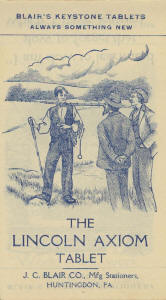 “Lincoln
Axiom Tablet” “Lincoln
Axiom Tablet”
J.C. Blair Co.
Huntingdon, Pa.
Occidental
College Special
Collections.
R2/43, #151.

- Charles
Bennett
This J.C.
Blair Company Lincoln
Axiom Tablet likely dates
from the first few decades
of the twentieth century,
and was manufactured in
Huntingdon, Pennsylvania.
It features seven
plates depicting Lincoln
in various aspects of his
life, followed by ten
sheets of blank paper (one
of which was torn off,
apparently used).
The quotes are a
smattering of famous
quotes from the Gettysburg
and Second Inaugural
Address combined with
lesser-known quotes that
exude Lincoln’s honesty
and work ethic (See
Example). The
point of this image is
likely to instill the
values of honesty and hard
work in young minds, as
well as educate students
about one of the major
figures in American
History (See
Example).
An ulterior
motive of the
advertisement is to
capture Lincoln’s image
and use it to sell a
product, as emphasized by
the affixation of an
advertisement to the front
of the tablet.
Return to
Top
|
|
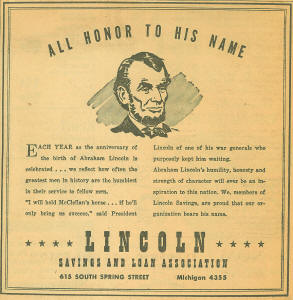 Advertisement
from Lincoln Savings and
Loan Asoc. Advertisement
from Lincoln Savings and
Loan Asoc.
Michigan.
February 1948.
Occidental
College Special
Collections. R2/43, #151

- Charles
Bennett
This
advertisement for the
Lincoln Savings and Loan
Association apparently
dates from February, 1948
(perhaps Lincoln’s
Birthday), making it one
of the newer
advertisements in our
exhibit. It was cut
from a Los Angeles area
newspaper, and contains
grocery store and coffee
advertisements on the
reverse. The
advertisement is
emblazoned with a portrait
of a bearded, presidential
Lincoln. Most of the
text in the article tells
of Lincoln’s deeds,
followed by a mention of
the Lincoln Savings
company. As with
many of the documents of
this collection, there is
an attempt at education of
Lincoln’s legacies.
However, the main
purpose of the document is
clearly to harness
Lincoln’s legacy for
promotion of a product.
Return to
Top
|
|
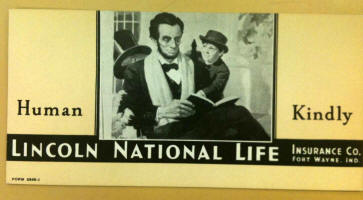
Advertisements
from The Lincoln
National Life Insurance
Company
Fort Wayne, Ind.
Occidental
College Special
Collections.
R2/43, #151
- Molly Storer

"Human,
Kindly"
This advertisement leaflet
depicts a bearded Lincoln
reading to a child. In his
chair, Lincoln appears
approachable, focused and
wise, while the child
looks at him with awe and
admiration. The words
“Human” and “Kindly” flank
the image in order to link
qualities of Lincoln to
qualities of the business
practices of the Lincoln
National Life Insurance
Company. The “Human” most
likely refers to Lincoln’s
emancipation of the slaves
and his consideration of
the slaves humanity.
“Kindly” also makes
reference to this aspect
of Lincoln. While the
purpose of this
advertisement is to sell
life insurance, the
secondary motive seems to
instill Lincoln’s values
in its buyers. This
leaflet was from Fort
Wayne Indiana, but seems
to have been widely
distributed.
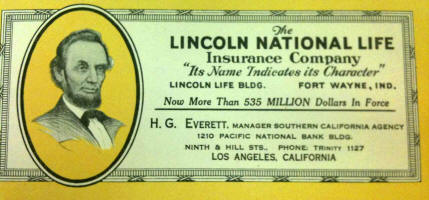
"Its
name Indicates its
Character"
This depiction of
Lincoln from the Southern
California Branch of the
Lincoln National Life
Insurance Company appears
with a focused stare and
an amused raised eyebrow.
Other than a vague facial
expression, not much can
be extrapolated from the
portrait of Lincoln. The
words “Its
Name Indicates Its
Character”
also appropriate ideals of
Lincoln to that of the
company in order to sell
the product. Lincoln must
have been a well-liked
historical figure in this
geographic region because
this life insurance
advertisement indicates a
favorable view of
Lincoln’s character.
What these
commercial representations
of Lincoln fail to
explicitly show connotes
an equally interesting
interpretation of the
documents. For instance,
the notion of a life
insurance company bearing
Lincoln’s name is ironic
considering the young and
seemingly inevitable death
expected for a man during
Lincoln’s wartime
presidency. The image of
Lincoln as a kindly
father-figure juxtaposes
the alternative version of
the War President
presiding over this deadly
draft. However, as told in
Drew Gilpin Faust’s “This
Republic of Suffering”,
the overwhelming instance
of death during the Civil
War certainly insured the
“life” of the Union. [1]
[1]
Faust, Drew
Gilpin. This Republic of
Suffering: Death and the
American Civil War. New
York: Knopf, 2008.
Return to Top
|
|
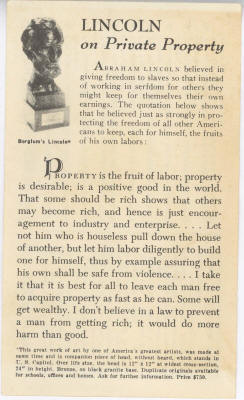 “Lincoln on
Private Property” “Lincoln on
Private Property”
Committee
for Constitutional
Government, Inc. New
York, NY.
Occidental
College Special
Collections. R2/43, #151.
- Molly Storer

This
advertisement for replicas
of Gutzon Borglum’s
sculpture of Lincoln
includes a quote of
Lincoln’s and an image of
the Borglum replica. The
image is quite small in
the context of the
leaflet, while the quote
takes up most of the space
on the page. Lincoln’s
quote imparts the value of
Freedom of property, and
that all men should have
the right to own it. This
quote provides the
incentive for owning a
decorative replica of a
famous Lincoln sculpture.
The secondary values
instilled in the buyer are
freedom and equality.
These are ideals
attributed to Lincoln
through the “Lincoln as
the Emancipator”
perspective.
The previously
mentioned commercial
representations of Lincoln
leave out any explicit
reference to slavery,
emancipation, civil war,
and national unity which
were ideologies paramount
during Lincoln’s
presidency. It seems that
in this more modern
representation of Lincoln,
these ideologies have been
conveniently forgotten and
paved over with ambiguous
ideologies in order to
associate a product with a
universally favorable
appropriation of Abraham
Lincoln. This fact
speaks to David Blight’s
theme of consensual and
invented memory in order
to allow reconciliation of
the historically divided
North and South. [1]
[1] Blight, David
W. Race and Reunion.
Cambridge:
Harvard University Press,
2001. 344-345.
Return to Top
|
|
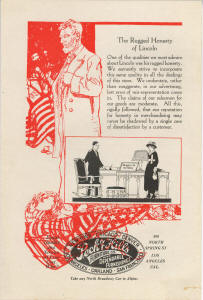
“Furniture
Fashions—The Rugged
Honesty of Lincoln”
The Peck
& Hills Furniture Co.
Pamphlet. Los Angeles, Ca.
September 1917.
Occidental
College Special
Collections. R2/43, #151.

- Emma
Thorne-Christy
This depiction of
Lincoln, taking up the
entire page of the back of
an eight-page pamphlet
entitled “Furniture
Fashions,” from September
1917, depicts a slightly
old, full-body Lincoln.
Illustrated in red, in
front of a celebratory
wreath, and two American
flags, this advertisement
for the Peck & Hills
Furniture Co. suggests the
similar qualities between
Lincoln and the way their
company does business:
honest, modest, and fair.
These adjectives employ
Lincoln’s persona as a
simple man raised on a
farm.
It is interesting that the
title describes Lincoln as
ruggedly honest. “Rugged”
seems like a very
masculine word to use in
an advertisement trying to
convince women to buy new
beds, sectional bookcases,
and writing desks for
their home. It is possible
that “rugged” is used
because it describes
Lincoln’s physique. As
Douglas L. Wilson points
out, Lincoln had the
“great strength and size”
perfect for such a job as
a blacksmith. [1] It also
may hearken back to
Lincoln’s life growing
back on the farm. The Peck
& Hills Furniture Co.
may have used the phrase
“rugged honesty” to
present Lincoln’s
common-farmer-man persona,
in order to sell furniture
to the everyday-American
family.
The advertisement
reads:
The Rugged
Honesty of Lincoln
“One of the qualities we
most admire about Lincoln
was his rugged honesty. We
earnestly strive to
incorporate this same
quality in all the dealing
of this store. We
understate, rather than
exaggerate, in our
advertising, lest error of
misrepresentation creep
in. The claims of our
salesmen for our goods are
moderate. All this,
rigidly followed, that our
reputation for honest in
merchandising may never be
shadowed by a single case
of dissatisfaction by a
customer.”
[1] Wilson,
Douglas L.
Honor's
Voice: The Transformation
of Abraham Lincoln. Vintage,
1999. pg 91.
Return to Top
|
|
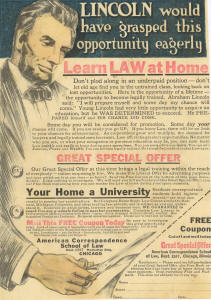
“Lincoln
Would Have Grasped This
Opportunity Eagerly”
The American
Correspondence School of
Law. Chicago, Ill.
Occidental
College Special
Collections. R2/43, #151.

- Emma
Thorne-Christy
In this
advertisement from a
learn-from-home law
school, Lincoln appears as
a young man using scissors
to cut off the ad’s coupon
and send it in to the
school for a free book
about the program. He
stands from the waist up,
with a genteel smile on
his face. The
advertisement is in the
patriotic colors red,
white, and blue with black
text and hints of peach
for Lincoln’s skin. This
advertisement has quite a
bit of text, and viewers
are drawn in by the first
word “LINCOLN” in
uppercase letters. This
advertisement depicts
Lincoln in his lawyer
persona.
The advertisement
is historically accurate
in that it depicts Lincoln
as self-educated. However,
this self-education, as
Douglas L. Wilson observes
in his book
Honor’s Voice,
may be embellished and has
become a legend. Wilson
argues: “Legends, by their
nature, are not so much
factual accounts as
symbolic embodiments or
expressions of what the
facts represent”. [1]
Lincoln’s self-education
does not merely mean that
the man taught himself,
but that he was self-made:
“What was remarkable was
that he had found a
vocation largely on the
strength of his appetite
for reading and
intellectual effort”. [2]
This “myth of the
self-made man” is
thoroughly ingrained in
American society. The
American Correspondence
School of Law is drawing
on the legend of
Lincoln-the-self-educated-president,
in order to encourage
others to emulate him by
buying and using the
school’s product. Most
interestingly, the
advertisement suggests
that you could become the
next President if you
prepare yourself.
[1] Wilson,
Douglas L.
Honor's
Voice: The Transformation
of Abraham Lincoln. Vintage,
1999. pg 54.
[2] Ibid., pg
54.
Return to Top
|
|
| |
About
this Project / Acknowledgements
Occidental
College's "Lincoln Legacies"
Research Seminar was developed by
Dr. Jeremiah B.C. Axelrod, Adjunct
Assistant Professor of History.
The library project
is developed in collaboration with
the Special Collections
Department:
Dale Ann Stieber, Special
Collections Librarian with student
staff
Alana Lemon and Brittany Todd.
Main graphic
images:
|
|
Page last edited on
03/12/2013.
Occidental
College Library Special
Collections & College Archives
© 2010 Occidental College
|
|
|
|
|
|